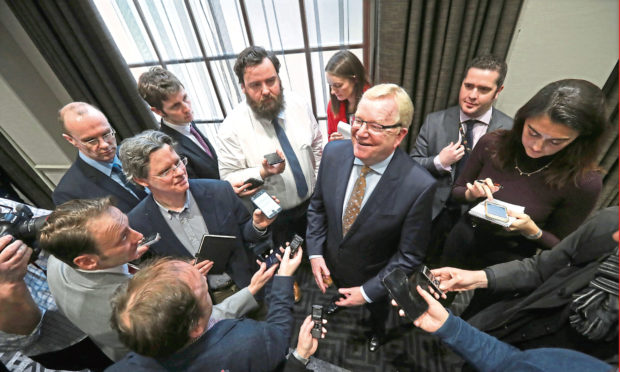We may not be returning to normal life soon, either in Scotland or in the rest of the UK, but there have been encouraging signs in the past few days that we are reverting to some of our old ways.
The unnatural political truce – between parties and between governments – was welcome for a while, as the whole of Britain saved its strength to battle a new enemy.
But the resumption of hostilities in some quarters is, like the blossom on the trees, a reminder that the world still turns and some things never change.
It was Scottish Conservative leader Jackson Carlaw who opened fire first, saying in an interview on Sunday that nationalists would “look ridiculous” if they tried to restart the independence debate on the other side of the coronavirus pandemic.
While he was correct in suggesting the public has more to worry about than constitutional matters, he probably didn’t need to spell it out right now. Nicola Sturgeon, though saying this week that Scotland could take its own path on the virus, made it clear at the beginning of the crisis that there would be no Indyref2 this year.
She has mostly managed to rein in her party behind the UK’s united approach to the Covid-19 measures.
In response to Carlaw’s remarks, the SNP said “the last thing any Scottish politician” should be doing was using the “appalling crisis… as an argument for or against independence”.
But party discipline is not what it was and the divisions that had dominated headlines just before the lockdown, with the explosive conclusion of Alex Salmond’s trial, appear to be resurfacing.
The SNP’s loosest canon in Westminster, Angus Brendan MacNeil, jumped on Carlaw’s comments, tweeting that the current circumstances highlighted that “dealing with your own problems unfettered and co-operating on your own terms is better”.
“It is good Carlaw brings up independence,” said the Western Isles MP, who is the greatest agitator for a speedy second independence referendum, “gives the SNP Scot Gov the opportunity to mention it too”.
With the Commons and Holyrood due back next week, remotely of course, these partisan spats will no doubt escalate.
In the meantime, a more immediate row is developing over how the Scottish Government is dispersing the chancellor’s business grants. When Rishi Sunak announced his £20 billion package for small firms, Scotland’s economy minister, Fiona Hyslop, told the Scottish Parliament that “every penny” would be passed on, with hospitality, leisure and retail properties all benefiting.
But while in England and Wales the £25,000 grants can be claimed for every premises a business operates, in Scotland the support is only available per firm, not property.
Scottish businesses with several branches claim they could collapse, as The Courier reported on Monday.
Retailers such as Wilkies, which has 14 shops in Scotland and employs 131 people, are at risk of going under, warned Labour MSP Alex Rowley.
An Angus businessman with three fish and chip shops said if he receives just a third of funding being offered elsewhere in the UK his company probably won’t survive.
But the SNP insists that its decision helps as many small enterprises as possible, arguing that Scotland has proportionately more employees in small and medium sized businesses than the rest of the UK.
This is unlikely to placate thousands of Scots who work for companies with multiple outlets, in danger of losing their jobs. Scottish ministers have asked the chancellor to “recognise the greater level of support” required in Scotland, but that sounds like the opening gambit in the SNP blame game. When the lockdown ends, and the regions of the UK begin to rebuild their battered economies, how soon before the grievances of Scottish workers are laid at Westminster’s door?
Beyond Scotland’s squabbles, it is politics as usual inside the Labour Party. There has been barely a pause in the factional in-fighting, and within hours, or maybe minutes, of Keir Starmer’s leadership triumph, the recriminations over Jeremy Corbyn’s demise and the name calling among the far left betrayed the opposition’s ongoing irrelevance.
But Starmer could use these strange times to his party’s advantage, without playing politics. He has yet (at the time of writing) to attend the government’s emergency Cobra meetings, although other political leaders, Sturgeon included, have virtual seats at the table.
Shadow chancellor Anneliese Dodds sidestepped the issue on Radio 4’s Today programme yesterday, but Starmer should dismiss Labour fears of being seen to prop up the Conservative government, postpone political grandstanding for a little longer and join the fray.
The Conservatives’ 80-seat majority may look invincible now, but Starmer will recall that when his wartime predecessor Clement Attlee took part in Churchill’s emergency coalition in the 1940s he emerged as the new prime minister in the subsequent election.
